| Introduction |
|
Is there life after N2Africa? A question I keep asking myself as we are in the final month of the very generous funding we have received from the Bill & Melinda Gates Foundation.
The answer of course is a resounding YES! ...
Photo: The latest N2Africa Doctor – Ilse de Jager – who received her PhD on the 18th June for her thesis entitled “Harvesting nutrition” supervised by Inge Brouwer and Ken Giller
|
 |
|
1 |
| Overview of N2Africa training and extension materials available |
|
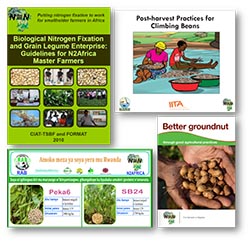
|
Under N2Africa Phase I and II, a wide range of training and extension materials about legumes (from production to marketing) and biological nitrogen fixation has been developed. ... |
|
2 |
| Highlights of N2Africa-Ethiopia in 2018 |
| The year 2018 was another exciting year for N2Africa-Ethiopia, bringing up the total number of beneficiaries so far reached by the project to 70,000 (in contrast to the 60,000 at the project completion) in 31 woredas of Amhara, Benishangul-Gumuz, Oromia and SNNP regions. |
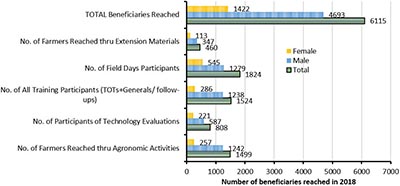 |
|
3 |
| Opportunities for developing the soyabean sector in Ghana |
Soyabean was introduced into Ghana in 1901. However, it was not until the mid-1990s, that it became an important crop in Ghana. During the past decade, production has increased steadily from 74,800 Mt in 2008 to 176,670 Mt in 2018 while area under cultivation has increased from 61,800 ha to 102,980 ha during the same period (MoFA, 2019). Ghana’s soyabean sector is rapidly growing because of development of the poultry and freshwater fishery industries as well as exportation of soyabean to countries such as Turkey and China. ...
|
4 |
| Some highlighted outcomes from 2018 (N2Africa Borno state, Nigeria) |
|
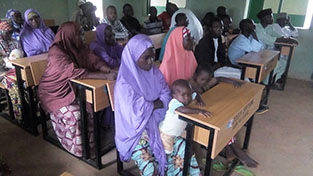
|
The 2018 community social mobilization exercise which was organized and conducted successfully in 40 new communities within the four local government areas of the project operational areas in Borno state. A total of 3,278 (1,987 M: 1,291 F) people participated. ...
Photo: Participants at one of the non-degree trainings sessions in Borno state, Nigeria
|
|
5 |
| N2Africa in Tanzania in 2018 |
|
In Tanzania the focus of 2018 was to implement the project exit strategy that fostered continuity of established activities by local governments, ensuring sustainable delivery of legume technologies (notably improved legume seeds, and inoculants) by public research institution and private sector and ensuring farmer’s access to markets. ...
Photo: Newly installed Soyabean solvent plant at Singida in Tanzania by MT Meru millers.
|
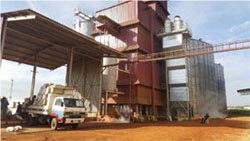
|
|
6 |
| Building an exit strategy for N2Africa project in Uganda - the prospects |
|
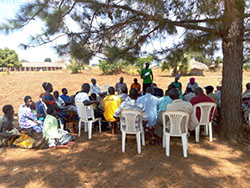
|
An exit strategy was inherent in the N2Africa project design to allow successful grain legume technologies at scale but also have a strategy for a pipeline of technologies to be continuously evaluated and availed to the farmers to improve their production systems and welfare. ...
Photo: Village agent, Mr Odyek (checked shirt 2
left from group leader in green), meeting a farmers group in Apac to collect information on inputs needed
|
|
7 |
| N2Africa project recognizes partners upon project closing workshop in Ethiopia |
| After being operational for more than five years in Ethiopia, N2Africa will end on 30 June 2019. To this regard, a workshop was organized on 3 May 2019 at ILRI Campus in Addis Ababa to recognize project partners and to close the project officially. ... |
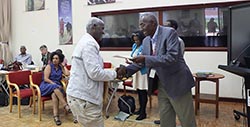 |
|
8 |
| N2Africa Policy recommendations workshop in Ethiopia and Tanzania |
|
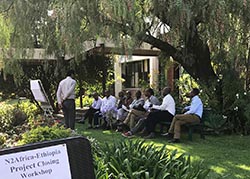
|
The N2Africa project organised two workshops with participants from government, private sector, research and NGO, to discuss policy recommendations for government and development partners for further support to the development of the legume sector. A first round of policy analysis interviews were held in December 2018. Policy recommendation workshops were held in Addis Ababa, Ethiopia, on 3 May and in Iringa, Tanzania, on 8 May.
Photo: One of the four working group sessions in Ethiopia
|
|
9 |
| Stakeholders approve recommendations for favourable policies to support increased production of grain legumes in Tanzania |
| Beginning December 2018, N2Africa project has undertaken a policy advocacy activity in two steps; i) bilateral consultations with 15 organisations (in government, private sector, NGO’s) to understand perceptions about the current functioning and policy recommendations, for the whole legume sector and of specific segments in the value chain, and ii) a multi-stakeholder workshop in which the results of the policy analysis were presented and discussed, and consensus sought about next steps. ... |
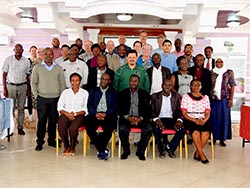 |
|
10 |
| Reports and other output uploaded on the N2Africa website |
|
11 |
| Related newsletters |
|
12 |










